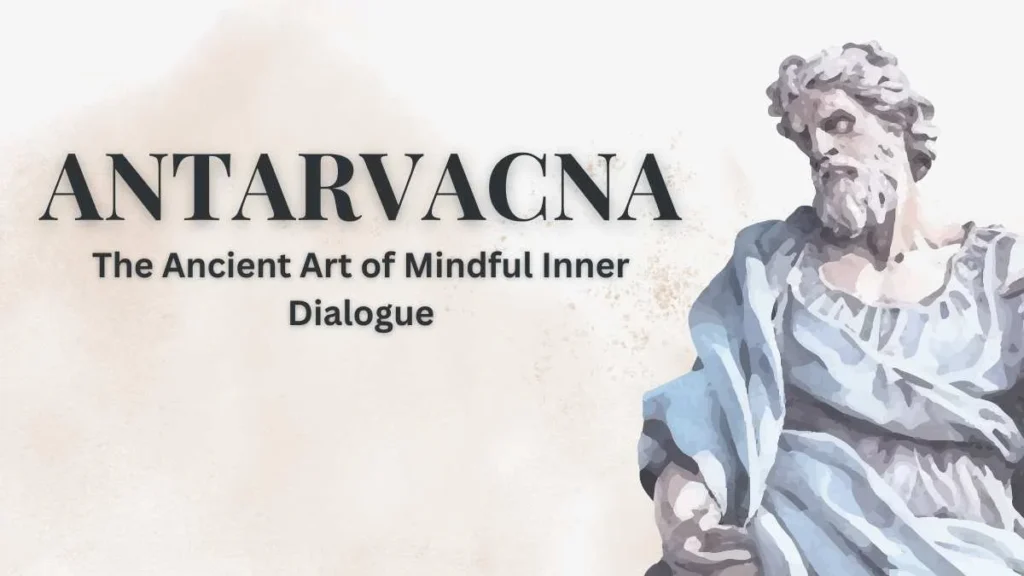In an age of constant notifications, endless content streams, and external opinions shaping our daily choices, the idea of turning inward can feel almost radical. Antarvacna (from Sanskrit antar “inner” and vacna “speech”) is the practice of engaging in mindful inner dialogue to understand one’s thoughts, emotions, and motivations, fostering self-awareness, clarity, and emotional balance.
Historical and Spiritual Origins
The concept of antarvacna listening to the inner voice emerges from a rich tapestry of spiritual philosophy and contemplative traditions in South Asia. While the exact term may not appear verbatim in ancient scriptures, its essence is deeply woven into the teachings of Hinduism, Buddhism, and related Indic schools of thought. Across these traditions, turning inward to discern truth, align with higher values, and cultivate self-awareness has been considered essential to both spiritual liberation and ethical living.
READ ALSO: Antarvwsna: Discover Your Subconscious Emotional Power
Core Principles of the Practice
Effectiveness and integrity form the basis of Antarvacna. The given principles help to make the inner dialogue purposeful, balanced, and transformative.
1. Mindful Awareness
There is the need to learn to listen before one can talk to oneself. This principle focuses on thought and feelings well being meaning it is in total being open to thoughts and feelings as they occur without being quick to translate or push something away. Mindfulness also makes sure that the conversation starts on the grounds of presence as opposed to distraction.
2. Active Engagement
Antarvacna in contrast to passive meditation welcomes the account that is a two-way communication with the self. The practitioner will not only be the talker but also the hearer, will ask penetrating questions, will explore solutions to them, and will explain ambiguities.
3. Emotional Honesty
Real development needs sincerity. The goal of Antarvacna is to challenge the practitioners to face emotions without putting them on hold or avoiding them, no matter how unpleasant they may be. Such openness builds trust in the self and better knowledge of oneself.
4. Values-Centered Reflection
Each internal discourse can be contacted at the basis of core inner values and ethics of the practitioner. Not only are decisions and insights considered in terms of responding to practicality but it is also determined in terms of congruence with moral compasses and purpose in life.
5. Compassionate Self-Response
The inner voice is hard to follow when it is difficult. Even in addressing mistakes and other vices, the tone used will be soft and encouraging, providing a peaceful mental environment towards growth and not abusive self-estimations.
Psychological Benefits of Inner Dialogue
The psychological benefits of practicing Antarvacna-the active interaction with one inner voice- are especially beneficial. It helps to organize the chaotic thoughts of the mind, stabilise emotions, and contributes to the well-being.
1. Enhanced Self-Awareness
Common self-dialogue leads to refinement of personal thinking styles, emotional stimuli and core values. It is this awareness, which builds up an individual and makes a human being what he or she is.
2. Improved Emotional Regulation
Naming and investigating emotions prevents the long-held emotions and thus helps to make these emotions less intense by making them overt. It results in more balanced responses particularly under stressful circumstances.
3. Reduced Inner Conflict
Having a honest talk with oneself enables one to handle some of the opposing thoughts and emotions productively before escalation builds up.
4. Clarity in Decision-Making
Intentional self-questioning can filter the decisions made and make them more values-based and less impulsive which will result in long-term goal-approaching effects.
5. Increased Resilience
Inner dialogue due to difficult situations increases psychological strength because people learn to use the internal resources themselves as guides and sources of comfort.

Antarvacna vs. Meditation
While antarvacna and meditation share common ground, they are not identical:
- Meditation often seeks to quiet the mind, focusing on stillness, breath, or a mantra.
- Antarvacna, on the other hand, involves engaging with thoughts as they arise, asking questions, and exploring answers within.
Challenges in Practicing Antarvacna
Like any practice, antarvacna is not without its difficulties:
- Overthinking Trap: The goal is insight, not endless mental loops.
- Emotional Discomfort: Facing suppressed emotions can be unsettling at first.
- Bias and Self-Deception: Without mindfulness, it’s easy to interpret answers in ways that reinforce existing biases.
Integrating Antarvacna into Daily Life
While Antarvacna has deep philosophical roots, its true value lies in how it enhances everyday living. By weaving mindful inner dialogue into routine activities, individuals can maintain clarity, emotional balance, and alignment with their values, even amidst life’s demands.
1. Morning Check-In
Start the day with a brief self-dialogue before engaging with technology or external tasks. Ask yourself:
- “How do I feel this morning?”
- “What matters most for me today?”.
2. Mindful Pauses at Work
Take short breaks to reflect on your current mental state. During a busy schedule, a one-minute inner dialogue can help identify stress points and recalibrate focus.
3. Decision-Making Moments
Before making significant choices, whether professional or personal pause to engage in Antarvacna. Explore your motivations, fears, and desired outcomes to ensure decisions are values-aligned.
Cultural and Ethical Dimensions
Being laid in Hindu and Buddhist traditions, Antarvacna has both personal and cultural and philosophical implications. Appreciation of its roots makes the practice original and conscious of its religious roots.
Ethically, Antarvacna demands integrity. One should use the insights in the way which respects both themselves and others, not making self-interested justification that eliminates ethical consequences.
Conclusion
Antarvacna is a precious and unusual chance toveer towards the inner world in the world that is full of outer noise and demands. It is not merely a meditative practice although more action oriented and values based than most meditative processes is a dialog with the self, which promotes clarity, emotional stability, and personal integrity. Listening and talking back to our inner voice we can build the bridge between the thought and action connecting them to the fundamental beliefs we hold in our everyday choices.

Brooke Jennings is an accomplished multi-niche content writer with a passion for crafting insightful, well-researched, and reader-friendly content. With over a decade of experience in digital journalism and copywriting, she has contributed to blogs, magazines, and corporate websites across a wide range of industries.

